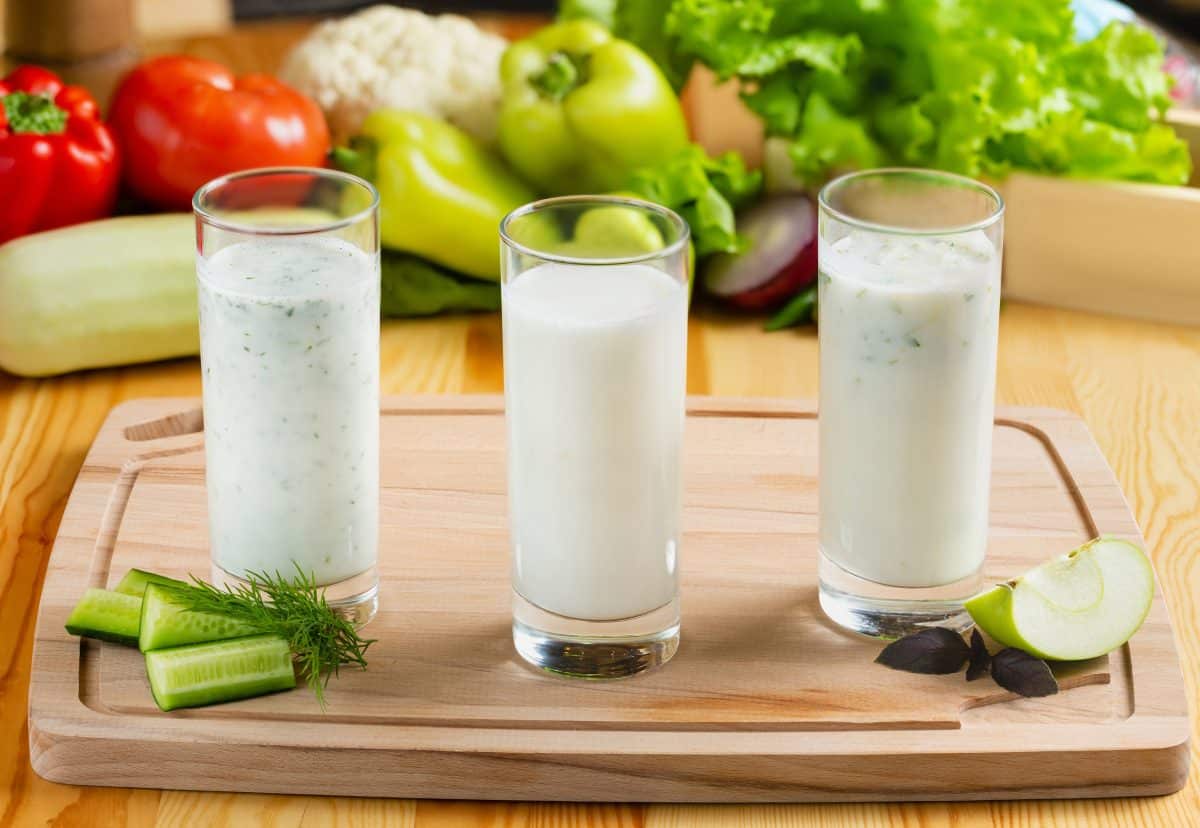Does kefir help IBS or worsen it? 10 recipes included
- Dietary Advice (non Low FODMAP)
If you’re wondering, is Kefir good or even safe for people with IBS, read on to find out more!
Kefir is rapidly becoming the latest craze. With claims of prevention against various conditions, does this fermented drink bring new hope for Irritable Bowel Syndrome sufferers?
This blog will deep dive into using kefir for IBS and look at the research to see if there are any potential benefits or negatives.
We’ve included 10 kefir recipes and a video of making kefir at home!

What is Kefir?
Kefir is a type of cultured, fermented milk drink made from kefir grains (1).
Its sour taste can add a tart flavor to food and drinks, and it contains a good source of calcium (2).
You can find kefir in fermented dairy products such as yogurts, yogurt drinks, and desserts.
There are claims that kefir may help prevent and manage many digestive health problems, such as inflammatory bowel disease, diarrhea, and irritable bowel syndrome (3).
WHERE CAN I FIND KEFIR?
Kefir used to be difficult to find but with a rise in popularity you can find it in most major supermarkets now.
Given that most kefir is made with fresh dairy, you will find it in the chilled aisles at the store. You may also sometimes find kefir products in cafes too, due to its popularity.
Kefir products are usually in bottle forms and suitable for drinking or adding to other foods and drinks.
You can also get kefir yogurts, which have a thicker texture compared to kefir drinks.
WHAT ARE THE NUTRITIONAL BENEFITS OF KEFIR?
Kefir is not only a tasty choice but can also provide nutritional benefits, as listed below (2).
A typical portion of kefir would be a cup (243mls) and this portion would provide on average:
- 104 calories
- 9g protein
- 2.5g fat
- 11.6g carbohydrate
- 316 mg calcium
- Plus small quantities of other vitamins and minerals such as vitamins A, C, D, E, K and B-vitamins and magnesium, phosphorus, potassium and sodium.
You can enjoy Kefir as part of a healthy and balanced diet.
WHAT IS WATER KEFIR?
Water kefir is different from milk kefir despite being made in a similar way. The kefir grains are placed in water, though.
Water kefir is still fermented, which produces beneficial bacteria within the product.
The difference is that water kefir has less sugar in it and can be used if you are following a dairy- free diet. It won’t have the same protein or calcium content though.
IS KEFIR GOOD FOR IBS?
When looking at kefir specifically, there is no scientific research on its use in IBS.
Sadly we can’t be clear whether this would help your symptoms or not. More research is needed before recommendations can be made.
For more information on IBS – check out IBS FAQ – Common Questions Answered.
IS KEFIR LOW FODMAP?
Up to 1 tablespoon of kefir is considered low FODMAP, however you can have up to 3 tablespoons of kefir on the low FODMAP diet as this is ‘moderate FODMAP’ which is still allowed (4).
The reason that a small amount of kefir is low FODMAP is because of the fermentation process used to make the product.
Milk is high in lactose but the kefir grains used to make kefir will eat away at lactose meaning that the end product is lower in lactose.
However, the end product does still contain some lactose making it high FODMAP in larger quantities.
We’ve put together a blog on the Low FODMAP diet for further information.
IS KEFIR A PROBIOTIC?
Kefir is not a probiotic, despite it being a type of fermented milk that contains live bacteria and yeast (1,3).
This is because the live microorganisms that are found in Kefir have not been proven to have a beneficial health effect.
Kefir has not been shown to provide IBS symptom relief, but there are many other credible ways to help with your IBS that have been backed by evidence-based research.
We’ve put together a blog on The IBS diet Ultimate Guide which can guide you through recommended and non-recommended methods to relieve IBS symptoms.
There are other blog posts all about probiotics which you may find helpful:
- The best probiotic for IBS d (5 research backed options)
- Can you take prebiotics and probiotics together?
- What is the best probiotic for anxiety? 3 x research-backed options

CAN KEFIR IMPROVE LACTOSE INTOLERANCE?
Unfortunately, there are no accurate studies to support that kefir can improve lactose intolerance.
One previous study did suggest that kefir can help improve lactose intolerance (5).
However, the study used hydrogen breath testing which has since been shown not to be an accurate way of diagnosing lactose intolerance.
For further information on the diagnosis, testing and management – read our blog on Lactose Intolerance – What, Where and Why?
KEFIR FOR IBS RECIPES
If you want to add Kefir to your diet, we’ve searched for the best recipes that use kefir in them:
Milk kefir recipes:
- Chocolate Kefir Cake Recipe
- Turmeric Smoothie with Kefir (Golden Milk) – Spiced Lassi
- Milk Kefir Second Ferment (Flavor & Sodas!)
- Banana Smoothie Recipe with Kefir Milk, Frozen Berries and Almonds
- Cod Cheek Recipe With Pickled Cucumber and Kefir
Water kefir recipes:
- Water Kefir Limeade
- Cherry Water Kefir Soda (Naturally Fizzy)
- Ginger Ale Water Kefir
- Blueberry Water Kefir Soda
- Orange-Vanilla Water Kefir
Check out this video on how to make kefir at home too!
SUMMARY
Kefir is becoming a popular choice of product to buy, and it is becoming widely available in many stores and cafes, as a cultured, fermented milk drink.
You can get nutritional benefits from kefir, including calcium, protein and small amounts of vitamins and minerals.
There is currently no evidence to support kefir providing IBS symptom relief and no evidence to suggest that kefir can improve lactose intolerance. Research in this area is in its infancy.
You can have 1 tablespoon of kefir in one sitting, which is low enough to be classed as low FODMAP. Enjoy kefir as part of a healthy, balanced diet.